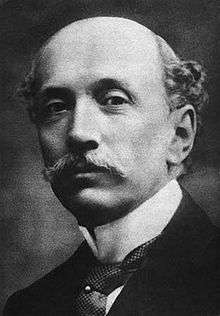Eduardo Dato
| Eduardo Dato | |
|---|---|
 | |
| Prime Minister of Spain | |
|
In office 27 October 1913 – 9 December 1915 | |
| Prime Minister of Spain | |
|
In office 11 June 1917 – 3 November 1917 | |
| Prime Minister of Spain | |
|
In office 28 April 1920 – 8 March 1921 | |
| Personal details | |
| Born |
12 August 1856 A Coruña, Spain |
| Died |
March 8, 1921 (aged 64) Madrid, Spain |
| Political party | Conservative Party (Spain) |
Eduardo Dato e Iradier (12 August 1856 – 8 March 1921) was a Spanish political leader. He served three times as Spanish Prime Minister: from 27 October 1913 to 9 December 1915, from 11 June 1917 to 3 November 1917, and from 28 April 1920 until his death. Also he held eleven cabinet ministries, and was four times President of the Spanish Congress of Deputies (a role approximating to that of parliamentary Speaker).
Career
Born in A Coruña, Spain, son of Carlos Dato y Granados (himself the son of Carlos Dato Camacho y Marín and wife Cayetana Ruperta Granados y García, de Vivancos e Acosta) and wife Rosa Lorenza Iradier e Arce, of Galician descent, he moved with his family to Madrid while still young, gaining a place at the renowned Instituto San Isidro, and finally obtaining a degree in Law at the Complutense University in 1875.[1][2] He opened his law office two years later. Elected to the Spanish parliament in 1883, he became Under-secretary for the Ministry of the Interior in 1892.
He held the position of Minister of the Interior and Minister of Justice over the next fifteen years. In 1907, he ran for and won the position of Mayor of Madrid. In 1910, he entered the Academy of Moral and Political Sciences. In 1913 he became Prime Minister of Spain for the first time. In 1915, he left that position, but would return to it for a short while in 1917. He became the 230th Minister for Foreign Affairs from 22 March 1918 to 9 November 1918. Then he moved to the post of Minister of State and stayed there until 1920, when he led the government as Prime Minister again.
Dato was a member of the International Permanent Court in The Hague (he became Vice-President in 1913), member of the International Law Institute, administrator of the bank firm 'Banco Hipotecario' and President of the National Institute of Social Security, the Council of Public Instruction and the Academy of Jurisprudence and Legislation.
Assassination
On 8 March 1921 in Madrid, while being driven from the parliament building and in front of the Puerta de Alcalá, Dato was assassinated by three Catalan anarchists, Lluís Nicolau, Pere Mateu, and Ramon Casanelles, who were riding a motorcycle. This was the second murder of a Spanish prime minister in less than a decade; in 1912 José Canalejas had been killed similarly.
King Alfonso XIII of Spain posthumously created him a Duke by bestowing the title "Duchess of Dato" on his widow.
Decorations
Dato received the following decorations and awards:
- Chain of the Order of Charles III
- Knight Grand Cross of the First Class of the Order of St. Gregory the Great of the Holy See
- Grand Cross of the Order of Christ of Portugal.
- 340th Grand Cross of the Order of the Tower and Sword of Portugal.
- After he died, his wife was granted the title of Duchess of Dato in his honor.
Marriage and children
He married María del Carmen de Barrenechea y Montegui, Dame of the Order of Noble Dames of Queen Maria Luisa of Spain and Grand Cross of the Order of Beneficence of Spain, of Basque descent (- Madrid, 1926), daughter of Juan José de Barrenechea e Urdampilleta (himself the son of Pedro de Barrenechea y Zubea and wife María Ignacia de Urdampilleta y Lagarto) and wife Micaela Montegui y Mercaide (herself the daughter of José Manuel Montegui and wife María de la Concepción Mercaide), and had three daughters:
- Isabel Dato y Barrenechea, 2nd Duchess of Dato, unmarried and without issue
- María del Carmen Dato y Barrenechea, 3rd Duchess of Dato (Madrid, 6 December 1885 - 1954), married to Eugenio Espinosa de los Monteros y Bermejillo, and had issue, two sons
- María de la Concepción Dato y Barrenechea (Madrid, 2 May 1890 - Madrid, 16 September 1973), married in Paris, 25 April 1922 to Ernesto de Zulueta e Isasi, of the Marquesses of Álava Viscounts of Casa Blanca (Bilbao, 26 April 1892 - Madrid, 9 September 1969), a Spanish Diplomat, and had issue
References
External links
See also
- Ribera, José António Moya, Costados, N.º 81